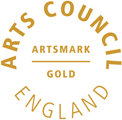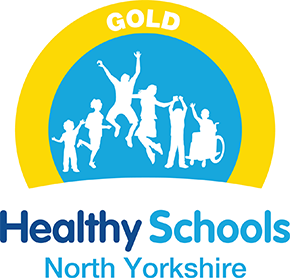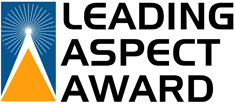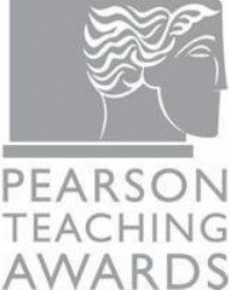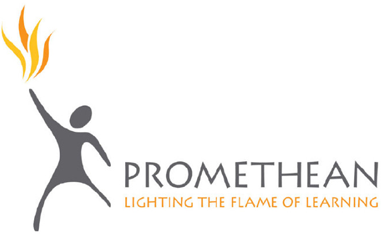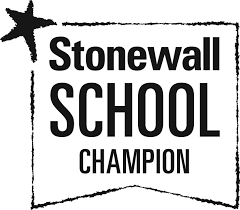LITERACY AT SELBY HIGH SCHOOL
At Selby High School, every teacher is a teacher is a teacher of literacy, and building reading, writing and speaking skills underpins all learning.
Led by the school’s English department and Literacy Lead, supported by the SENCO and SEN team, and implemented by all teaching staff in every department, the strategies below aim to help every one of our students become:
- A keen and skilled reader
- An expressive and accurate writer
- A clear and confident speaker
Achieving these aims is only possible if the school works in partnership with students and their parents, so alongside the strategies are tips to ensure students can make the maximum progress, and that parents, carers and guardians know what they can do to help and support their children.
1. A Keen and Skilled Reader
Accelerated reader programme
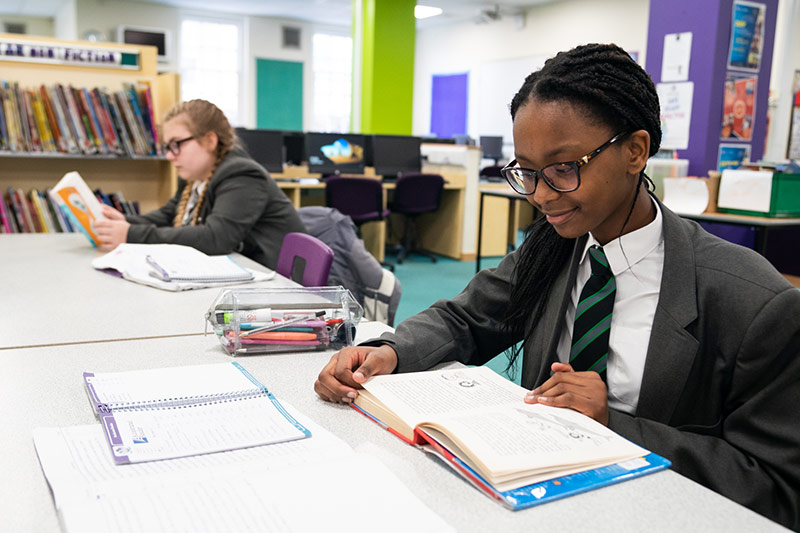 What do we do in school?
What do we do in school?
- Students complete a multiple choice, STAR reading test, three times a year.
- This generates a measure of their reading age and a ZPD (Zone of Proximal development) code.
- The reading age is used to track progress and identify students for intervention, alongside other data and testing.
- The ZPD code is given to students to help them to select books that will develop their reading skills*.
* Students are retested each term to measure progress and to generate a new ZPD code
What do I need to do if I am a student?
- Select books within your ZPD range from the LRC.
- In Year 7-9s you will read for 20 minutes per week, 5 times a week.
- Try your best to finish a book each fortnight.
- Within 24 hours, complete a quiz on Accelerated reader.
- You will receive praise and reward points for completing quizzes with a pass score (over 80%).
- You win a ticket for a prize draw if you score 100% on a quiz.
- Postcards are issued fortnightly for impressive achievements within each English group.
- If you reach 1 million words you will be congratulated and feature on a display near the LRC!
How can we support as parents / carers / guardians?
- Remind students positively to complete their reading practice and other reading at home.
- Discuss their book choices with them. Whenever possible, discuss your child’s reading and be positive about reading.
- Reading to your child, listening to them read and sharing the books.
- Use the Accelerated Reader platform to discuss and help select books that they might enjoy.
- Use school reading lists to help your child select books that are recommended as appropriate for their age group.
Access to Books and Celebration of Reading
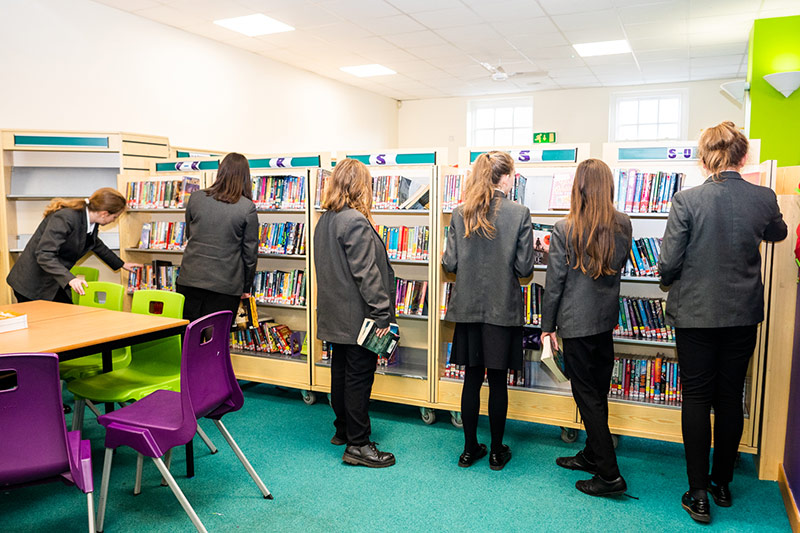 What do we do in school?
What do we do in school?
- As well as an LRC (library) hub lesson every two weeks in English (Years 7-9), students can go to the library to read and change books at these times.
- Every Year 7 gets to choose a free Bookbuzz book from a wide selection which they receive before Christmas.
- Every Year 7 and 8 gets to choose a free book for World Book Day which they receive in March.
- As well as texts they are studying, Year 7s, 8s and 9s read a book for pleasure in their LRC lessons.
- Teachers share what they are reading, and tutors read short topical articles or extracts in PD time.
- During World Book Day, tutor groups compete in a book related competition, and class teachers read part of a short story during each lesson as part of our ‘Big Read’.
What do I need to do if I am a student?
- Have a look around the LRC at these times– talk to Miss Francis or your English teacher for suggestions. Also look at recommended books here.
- Use the LRC Online to see what is in the library and to reserve books.
- This guide will help you to find sections with non-fiction books you are interested in.
- Look at reviews of books online (e.g. on BookTok) or from other Selby Students to help you choose something good to read (more reviews here!).
- If you don’t fancy carrying a physical book around, check out the school’s digital library (please log in to RSL first).
- Share recommendations with your friends, and discuss why you like books.
- In Year 9 and 10 you can join a reading group with Miss Francis in the LRC, reading and discussing the year’s Carnegie award nominated and winning books.
How can we support as parents / carers / guardians?
- Provide access to books whenever you can.
- If the cost of new books is an issue, good condition second hand books are available to buy online.
- Selby and other local libraries allow free loans of books and also offer loans of digital and audio books.
- Encourage students to use the LRC to take books out and request books for order that are not currently there.
Reciprocal Reading
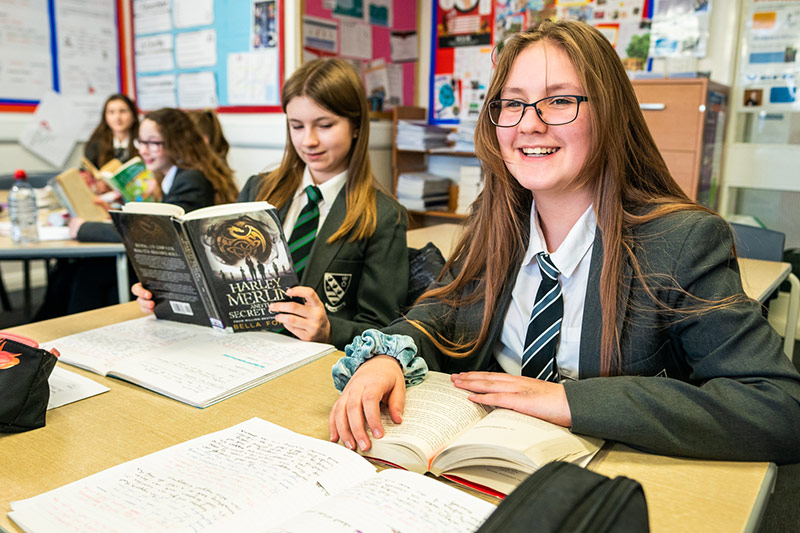 What do we do in school?
What do we do in school?
A whole school approach to reading and understanding high-challenge texts.
- Step 1: Make predictions about what a text will be about based on the title, any images and prior knowledge.
- Step 2: Read the text and record any questions / unknown vocabulary which can be clarified by the teacher or in discussion.
- Step 3: Summarise key information from the texts, e.g by using bullet points or a mind map. These steps are practised in a variety of subjects.
What do I need to do if I am a student?
- Try to learn these steps and apply them when you approach any new or difficult texts in and out of school.
- This will help you to develop good study skills for when you are older and need to find out information more independently.
How can we support as parents / carers / guardians?
- You can support by encouraging students to read shorter, more challenging texts e.g. sections of books aimed at adults, or newspapers, websites or magazines.
- Discussing what the text is about and any new or difficult words will build confidence and encourage your child to seek out new, more difficult texts themselves.
Extra support for Reading
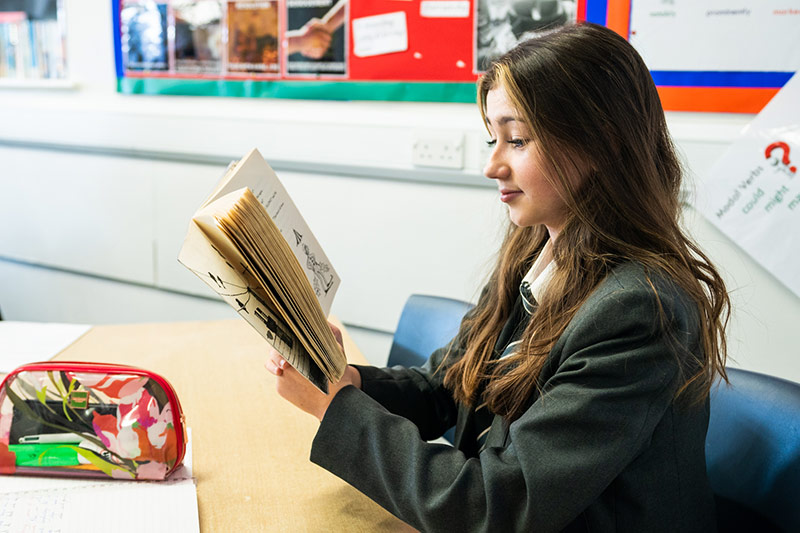 What do we do in school?
What do we do in school?
If KS2 reading SAT, accelerated reader scores and teacher observations indicate students would benefit from extra support with reading, the school runs a range of literacy interventions including:
- Phonics
- Catch up Literacy
- Reciprocal Reading
- Peer reading
- Read Theory
How can we support as parents / carers / guardians?
- If you are concerned about your child’s reading ability or levels, please contact their English teacher or Mrs Lockhart (the school’s Special Educational Needs Co-Ordinator)
2. AN EXPRESSIVE AND ACCURATE WRITER
IZ – Independent Zone
 What do we do in school?
What do we do in school?
- An extended period of time (typically between 10 and 20 minutes) where students work independently in silence.
- All students, but particularly students with additional learning needs will receive scaffolding, advice, models and information to enable them to succeed in these tasks.
- For the first few minutes of IZ, students are expected to work totally independently, developing resilience by trying to find solutions to difficulties themselves.
- This is important to help them to become self-reliant by the time they sit their GCSE exams.
- After the opening few minutes, the teacher can offer support to those who are struggling whilst the class continues to work independently.
What do I need to do if I am a student?
- Have the correct writing equipment - and spares to ensure you can start quickly.
- Make sure you are focused and resilient during IZ.
- Try to find somewhere quiet to work at home where you complete home learning without distractions to build your concentration.
- If you struggle to avoid distractions such as notifications on your phone, try the Forest app, which rewards you for focusing for 25 minutes in a row by growing a virtual tree. The makers will also plant a real tree!
How can we support as parents / carers / guardians?
- Ensure that your child has working black and red pens, pencils and highlighters and glue sticks – and spares.
- Contact school for assistance if you are struggling to equip your child with these essentials.
- Try to find a quiet, uncluttered space at home for students to complete reading and home learning quietly without distractions.
- Encourage students to work for 25 minute spells followed by a 5 minute break.
- Some students may need to start with shorter time periods, e.g. 10 mins, to build up to this.
Developing accuracy
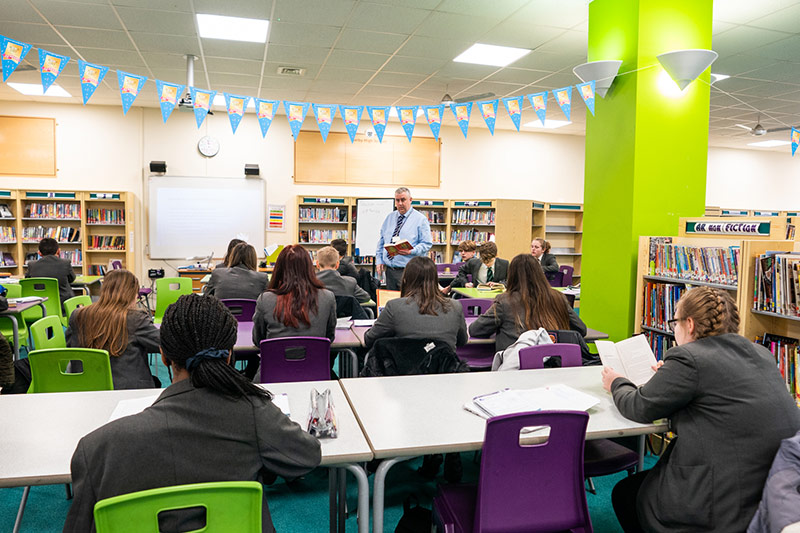 What do we do in school?
What do we do in school?
- Teachers will regularly complete book looks of samples of a class's books to identify and address common errors that are made.
- Particularly in English, but also in other subjects, Whole Class Feedback will address common literacy errors made by the class, and reteach key accuracy points.
When teachers mark books they will identify in green pen errors in accuracy that students need to address, and support by offering key spellings or grammar and punctuation corrections. - During IZ the teacher may also live mark work - indicating parts of students’ writing that needs checking by the student for accuracy or which contains errors or misconceptions.
- Students with additional needs, e.g. dyslexia, may receive additional support through in class teaching assistants or writing interventions.
What do I need to do if I am a student?
- Use the Power of Proofreading page (36) in your planner to check for errors in lessons after you have attempted a writing task.
- Use the grammar pages (from page 37) to help you to correct common errors.
- Use a dictionary in English and other lessons to check your spelling.
- Use this proofreading guide for Spanish.
- You can use an online dictionary or your phone to check spelling at home.
- When checking your work, make corrections in red pen.
- If you are not sure whether part of your writing is correct, underline it in red pen for the teacher to check or ask for help.
How can we support as parents / carers / guardians?
- Use the Student planner pages to assist your child in improving the accuracy of their writing.
- Encourage them to reread their work at home and to find and correct any inaccuracies. If you can help them to improve accuracy, even better!
- Practising spellings of tier 2 words from their planner, other key words, or words they have misspelt will help them to learn correct spellings.
Tier 2 and Tier 3 Vocabulary
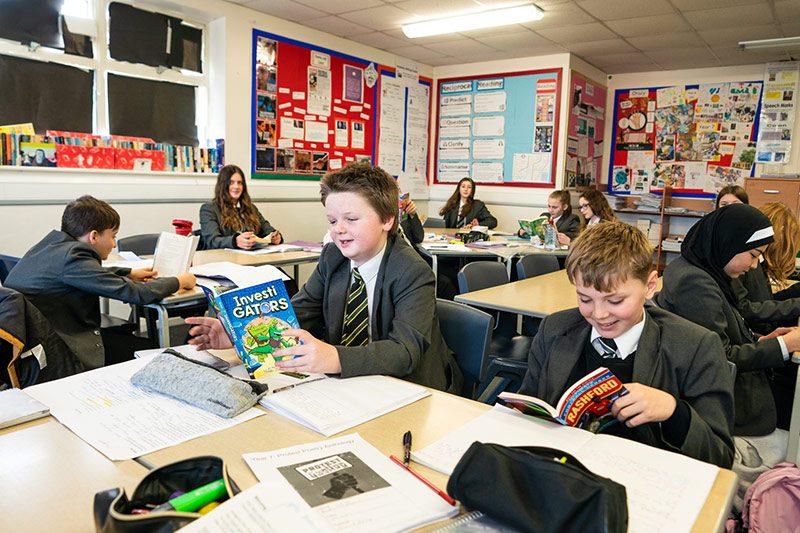 What do we do in school?
What do we do in school?
- Tier 2 Vocabulary means words that are more complex which are more commonly found in written texts than are spoken.
- Tier 3 Vocabulary means words that are associated with a particular school subject or specialist area.
- Building understanding of new words is essential for learning concepts and allowing students to communicate about new ideas.
- At Selby a new tier 2 or 3 word is introduced during most lessons.
- This is introduced in a range of sentences so the word is understood in context.
- Students then record the word and its definition, and use it in a sentence of their own or their own written or spoken work.
- Tier 3 words are shared via word lists, glossaries, displays and word mats so that students can check their meanings
What do I need to do if I am a student?
- Record Tier 2 and Tier 3 words in your planner during lessons.
- Write sentences using these words, then use them in class talk.
- Use the list in your planner to check spellings or meanings and to revise.
- You may be given word lists during the teaching of topics to make learning these words easier.
- Get a family member or friend to test you by giving you either the meaning or definition to check what you can remember.
- You can also use these lists to practise spellings.
How can we support as parents / carers / guardians?
- You can help your child by testing them on the Tier 2 and 3 words in their planner by either asking for the definition of a word, or the word that has a particular meaning.
3. A CLEAR AND CONFIDENT SPEAKER
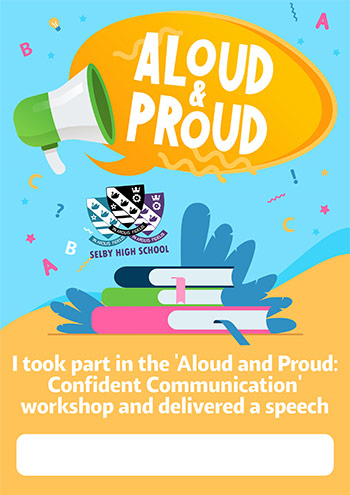 What do we do in school?
What do we do in school?
- Students are encouraged to speak clearly in full sentences in all subjects.
- They will be asked questions and participate in short informal discussions, but will also be involved in more formal discussions and presentations.
- During their first diversity day, Year 7 students participate in a speaking and listening activity in their PD groups called ‘Aloud and Proud’.
- This involves them working to develop their skills and confidence to plan and deliver a talk to the rest of their group.
- Plan and deliver a talk using the PEEEP structure: State your Position, Explain it, give Evidence for it, Expand it, Repeat your original Point.
- Develop confidence using the 5Ss: Stand with confidence, Stride with purpose, Smile, Speak up, Stay at the end.
- These structures are reinforced in English and in lessons across different subjects at a number of points in the year.
- As well as giving students a framework to develop their speaking and listening skills and confidence, it also prepares them for their Spoken Language endorsement.
- This is a presentation that all GCSE English Language complete that is graded Pass, Merit or Distinction and features on their GCSE results certificate.
What do I need to do if I am a student?
- At the right times, have the confidence to speak up in lessons.
- Answer questions in lessons in full sentences.
- Get fully involved in discussions.
- For extended speaking tasks prepare by practising, ideally to an audience of family or friends, or by recording yourself on your phone and watching yourself back.
- Use the planner pages about PEEEP structure and 5Ss in your planner to get organised and grow you confidence.
How can we support as parents / carers / guardians?
- If students have a presentation in a subject, help them by listening to them practise
- You can give them feedback on how they deliver their talk using the 5Ss: Stand with confidence, Stride with purpose, Smile, Speak up, Stay at the end.
- You can also check they have organised their talk using the PEEEP structure: State your Position, Explain it, give Evidence for it, Expand it, Repeat your original Point.
More subjects to follow soon!


